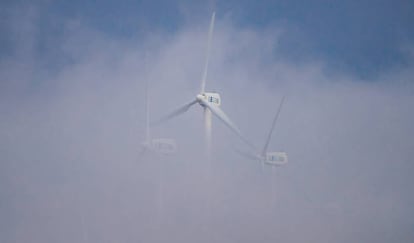EU Parliament wants more ambitious renewable energy goals for 2030
Team led by Spanish MEP proposes target of 35%, above the Commission’s proposed 27%

The European Parliament wants production of energy from renewable sources between 2020 and 2030 to meet more ambitious goals than those suggested by the executive in Brussels. Renewable-energy production will be key to ensuring that the European Union itself complies with the UN-sponsored Paris Agreement, the first universal and legally binding global climate deal.

While the European Commission wants production of at least 27% of energy in 2030 to come from renewable sources, a final report by the MEP in charge of this matter, Spaniard José Blanco, raises this figure to 35%, and asks to restore binding national targets.
In what direction does a Europe that proclaims itself a world leader against climate change want to head? Does it want to drift along on the issue of renewable-energy production, or does it want to set itself ambitious goals that will entail greater effort? This, in a nutshell, is what the EU must now decide.
The report will now require approval by the EU Parliament’s energy committee and by the plenary session
The union is now working on the regulations that will set clean-energy goals for 2030, since the 2020 targets – reaching 20% of energy from renewables – are already in place. The final document is expected to be ready and approved by the summer of 2018. Negotiations are three-way, between the EU Commission, the Parliament and the governments of the various member states.
After signing the Paris Agreement in 2015, Europe already knows where it needs to be by 2030: it must have achieved a 40% reduction in greenhouse gas emissions, which scientists agree are responsible for global warming, down from 1990 levels. The next step is to define the instruments to reach that goal. And the energy sector is key in this respect.

Late last year, the European Commission presented its so-called Winter Package, a proposal for an energy directive for the 2020-2030 period. This package of measures stated that production of at least 27% of energy should come from renewable sources by 2030. But environmental groups and the renewables sector complained that this goal lacked ambition. These critics said that the EU was just drifting along on clean-energy issues, and even stepping on the brakes when it comes to encouraging clean energy, which is becoming increasingly competitive as demonstrated by an electricity auction held in Spain this past Wednesday.
Between 2004 and 2015 (the last year with final Eurostat figures), the percentage of renewable-energy consumption grew from 8.5% to 16.7%. An official report by the EU Commission admitted that, simply by maintaining the current situation without introducing any additional measures – business as usual – by 2030 Europe will have reached 24.3% of renewable energy over final consumption. And that is without taking into account technological advances that are considerably reducing the costs of wind and solar energy, year after year.
The report – led by José Blanco, a member of Spain’s Socialist Party – was finished on Wednesday. The document, to which EL PAÍS has had access, proposes raising the 2030 goal to 35%. The report will now require approval by the EU Parliament’s energy committee and by the plenary session. Parliament sources said that in any event, the final proposal will be more ambitious than the Commission’s original goal. A year ago already, the EU Parliament said that this goal should be at least 30%.
National targets
Blanco’s document also proposes restoring “binding national targets.” This is because, while the current 2020 renewable energy plan details specific goals for each country, the Commission’s proposal for 2030 has dropped those country-specific targets. For many member states, these national goals represent a lot of pressure, as they often incur in delays and target failures that get released every year. Yet many experts note that this kind of public exposure is one of the most efficient tools in climate change policy.
Additionally, Blanco’s team wants to encourage self-production and avoid the kind of measures that hinder its development – an issue that particularly affects Spain, where consumers have accused the government of making it difficult and expensive to generate one’s own energy. The document specifically wants to eliminate existing fees on self-produced energy and storage if the facility is not connected to the general grid.
The Commission’s proposal also omits goals for the transportation sector. Blanco’s document asks for these to be written back in, and suggests a 12% goal of renewable energy for this sector, which is being particularly slow to decarbonize.
English version by Susana Urra.
Goal for Spain
The report by the EU Parliament’s Committee on Industry, Research and Energy includes an annex with the national goals that would fall to each member state if the global target of 35% were adopted.
In Spain’s case, its 2030 goal would be 36% of renewable energy out of the final energy consumption. In 2015, the last year with official figures, Spain was at 16.2%, still far from the existing 20% target for 2020.
These are the individual targets for all the EU countries. To calculate them, the report takes the criteria of the current directive on renewables.
Belgium, 26% renewables in 2030.
Bulgaria, 29%.
Czech Republic, 26%.
Denmark, 45%.
Germany, 34%.
Estonia, 38%.
Ireland, 33%.
Greece, 33%.
France, 38%.
Croatia, 34%.
Italy, 32%.
Cyprus, 27%.
Latvia,52%.
Lithuania,38%.
Luxembourg, 24%.
Hungary, 27%.
Malta, 28%.
Netherlands, 29%.
Austria, 48%.
Poland, 28%.
Portugal, 46%.
Romania, 39%.
Slovenia, 38%.
Slovakia,27%.
Finland, 50%.
Sweden, 63%.
United Kingdom, 32%.
Tu suscripción se está usando en otro dispositivo
¿Quieres añadir otro usuario a tu suscripción?
Si continúas leyendo en este dispositivo, no se podrá leer en el otro.
FlechaTu suscripción se está usando en otro dispositivo y solo puedes acceder a EL PAÍS desde un dispositivo a la vez.
Si quieres compartir tu cuenta, cambia tu suscripción a la modalidad Premium, así podrás añadir otro usuario. Cada uno accederá con su propia cuenta de email, lo que os permitirá personalizar vuestra experiencia en EL PAÍS.
¿Tienes una suscripción de empresa? Accede aquí para contratar más cuentas.
En el caso de no saber quién está usando tu cuenta, te recomendamos cambiar tu contraseña aquí.
Si decides continuar compartiendo tu cuenta, este mensaje se mostrará en tu dispositivo y en el de la otra persona que está usando tu cuenta de forma indefinida, afectando a tu experiencia de lectura. Puedes consultar aquí los términos y condiciones de la suscripción digital.








































